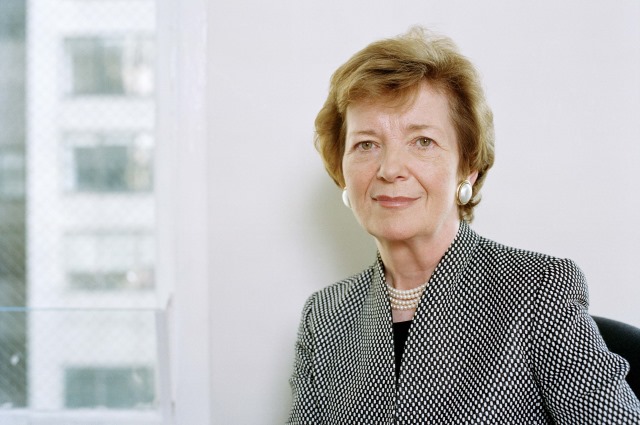Mary Robinson's Op ed in the Irish Times
Climate change: ‘Those of us in the industrialised countries of the world must take the lead and wean ourselves off fossil fuels’
There is a conversation that we need to have around our kitchen tables in Ireland. Among all of the pressing issues of our time, there is one which, if left unchecked, will exacerbate all others. And it hinges on a seemingly simple question – how do we power the world without destroying the planet?
Energy is the engine of development, but until now, we have generated most of this energy from fossil fuels. The reality is that we can no longer continue to power our economies this way because our dependence on fossil fuels is contributing to carbon emissions which are causing global warming.
In 1955 the Electricity Supply Amendment Act committed the equivalent of more than €6 billion in today’s terms to accelerate the electrification of rural Ireland. This electrification spurred a dramatic change in the quality of life for people living in rural communities taking some of the drudgery from daily life. Electric pumps provided fresh water, electric lightbulbs replaced dull and dangerous oil lamps, rural industry flourished and the radio reached more homes, bringing news and entertainment to rural families across the country.
Yet today, 60 years after the rural electrification of Ireland, there are still 1.3 billion people on the planet with no access to electricity. Three billion people rely on solid fuels to cook, resulting in household air pollution that kills more than four million people every year and sickens millions more.
At a time when the world is reframing global development goals and reorienting all countries on to a path of sustainable development, we have hard questions to ask ourselves.
Is it right that women are at risk because they have to deliver their babies by candlelight or that girls must spend their days collecting firewood for cooking rather than going to school? Is it morally right that so many people do not have access to the energy they need to reach their full potential?
In China and India, new fossil fuel-powered plants are being built (alongside a growing number of solar and wind installations) to meet the growing demand for electricity from factories, cities and households. Those governments are doing what governments elsewhere in the world have done and continue to do; they are striving to meet the energy needs of their people for their development. Yet if the world is to meet the energy needs of all people using our fossil fuel-dependent model, we will make large parts of planet earth inhospitable to life. We will bring about our own demise.
So we are faced with a dilemma. Can we really ask some of the poorest countries in the world to develop without using fossil fuels? To protect people and the planet we must; but the global community can only ask this if it is prepared to support developing countries every step of the way down this low-carbon pathway.
The transition to low-carbon development is a globally shared responsibility where those countries who have reaped the benefits of fossil fuel development enable others to follow a low-carbon development pathway.
Quality of life
Those of us in the industrialised countries of the world must take the lead and wean ourselves off fossil fuels. We have to be the first movers and prove that people around the world can aspire to a good quality of life without fossil fuels. This requires taking a long-term view that looks beyond the short-term political cycles of our nations in order to steer economies towards a more stable future.
Powering the world while protecting the planet is not an “us or them” dilemma. We are all in this together; developed and developing countries. We have to stand in solidarity with the people around the world who share the same aspirations as we do, but who will have to fulfil them without access to the dirty sources of energy we took for granted. What we ask of developing countries – to lift their people out of poverty and achieve their development aspirations without using the oil, gas and coal under their soil – is immense. We have to recognise the scale of the ask and support an unprecedented rollout of renewable energy in the developing world.
Before September is out, the world will have a new sustainable development agenda. The agenda has been negotiated by diplomats from every country in the world and will be gavelled into effect at the UN later this month. The new global agenda can steer us on a path to a safer, fairer world – but this requires political will and genuine leadership from all countries. To enable this leadership, we must bring the discussion of the future of our world into our kitchens and come to terms with what this means for us, as people and as global citizens. Only when these discussions are passed from the kitchen tables to the decision-making tables will the governments of the world have a true mandate to look beyond the myopia of political cycles and herald in an era of transformative change.
In Ireland, we have proven ourselves capable of taking on challenging conversations in the past – we must not shy away from this one.
Mary Robinson
This article was first published in The Irish Times on 17 September.
Related Links
Find out more about our work on access to sustainable energy
Meeting the Energy Needs of the Poorest: A Role for Social Protection


